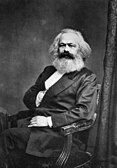Portal:Society/Featured biography/23
Karl Heinrich Marx (Berlin German pronunciation: [kaːɐ̯l ˈhaɪnʀɪç ˈmaːɐ̯ks], 5 May 1818 – 14 March 1883) was a German philosopher, economist, sociologist, historian, journalist, and revolutionary socialist. His ideas played a significant role in the establishment of the social sciences and the development of the socialist movement. He is also considered one of the greatest economists in history. He published numerous books during his lifetime, the most notable being The Communist Manifesto (1848) and Capital (1867–1894). He often worked closely with his friend and fellow revolutionary socialist, Friedrich Engels. Marx's theories about society, economics and politics—collectively known as Marxism—hold that all societies progress through the dialectic of class struggle: a conflict between an ownership class which controls production and a lower class which produces the labour for goods. Heavily critical of the current socio-economic form of society, capitalism, he called it the "dictatorship of the bourgeoisie", believing it to be run by the wealthy classes purely for their own benefit, and predicted that, like previous socioeconomic systems, it would inevitably produce internal tensions which would lead to its self-destruction and replacement by a new system, socialism. He argued that under socialism society would be governed by the working class in what he called the "dictatorship of the proletariat", the "workers state" or "workers' democracy".He believed that socialism would, in its turn, eventually be replaced by a stateless, classless society called communism. Along with believing in the inevitability of socialism and communism, Marx actively fought for the former's implementation, arguing that both social theorists and underprivileged people should carry out organised revolutionary action to topple capitalism and bring about socio-economic change. (Full article...)

